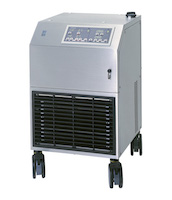
What is the Problem with Heater-Cooler Units?
Although the water in the unit moves through a closed system and does not come in contact with the patient, there is a possibility that contaminated water can enter other parts of the device. Bacteria can also be introduced into the air in the surgical suite via the HCU’s exhaust vent. This places patients – particularly those who may have compromised immune systems like heart valve, graft, LVAD, or heart transplant patients – at an increased risk of infection.
The FDA first took note of this issue in October of 2015 when it issued a Safety Communication that provided recommendations that could minimize a patient’s risk of contracting M. chimaera, a species of nontuberculous mycobacterium (NTM) associated with the use of the heater-cooler units. Later, in June of 2016, the FDA released an additional Safety Communication providing new information about the risk of M. chimaera infections associated with the use of HCUs in patients who had undergone cardiothoracic surgeries. The FDA continues to monitor the situation and, on October 13, 2016, released an update to its June 2016 Safety Communication with additional recommendations for hospitals and other facilities regarding the use of a particular HCU, the Stockert 3T Heater-Cooler System.
A recently published European study further solidifies this link. Clinical samples were taken from several cardiothoracic patients that underwent open-chest heart surgery and had been infected by M. chimaera. These samples matched those taken from the heater-coolers used during the patients’ surgeries, as well as matching environmental samples taken directly from the manufacturer’s production and servicing facility.
While the majority of these problems occurred with the Stockert 3T Heater-Cooler System, manufactured by the Sorin Group Deutschland GmbH (now a part of LivaNova PLC), other HCUs may have been affected by the harmful bacteria as well.
Signs and Symptoms of an Nontuberculous Mycobacteria (NTM) Infection
NTM is a serious infection that can cause severe illness, and even death. NTM infections are especially dangerous because patients with NTM infections may not develop signs or symptoms of the infection for months or years after their initial exposure.
NTM infections manifesting after cardiac surgeries present themselves in a wide variety of forms. These can include endocarditis, surgical site infection, or abscess and bacteremia. Other clinical manifestations have included hepatitis, renal insufficiency, splenomegaly, pancytopenia, and osteomyelitis.
Patients that have had cardiothoracic surgery should know and keep an eye out for any sign of a possible NTM infection after their procedure. These symptoms can include any of the following:
- Fatigue
- Difficulty breathing
- Persistent cough or a cough with blood present
- Fever
- Pain, redness, or pus at the surgical site
- Muscle pain
- Joint pain
- Night sweats
- Weight loss
- Abdominal pain
- Nausea and vomiting
- Failure to thrive (infants)
Do I Have a Legal Claim?
If you have undergone cardiothoracic surgery within the last several years and have subsequently been diagnosed with an NTM infection or experienced the above symptoms, you may wish to consider taking legal action.
Attorneys at Lopez McHugh can help you decide if a heater-cooler unit lawsuit may be right for you so contact us today to discuss your options. There is no cost to you unless we win.
